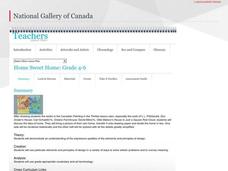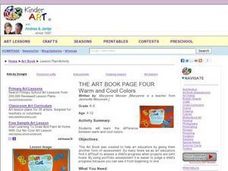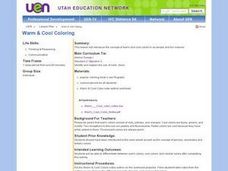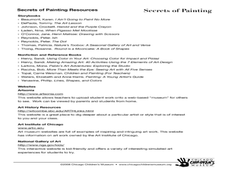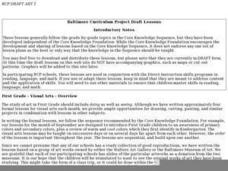Curated OER
Day of the Dead (Dia de los Muertos) - A Cultural Holiday: Color Exploration of Warm and Cool Colors
Young artists examine pictures from and discuss the holiday Día de los Muertos. The symbolic skull showcases the use of warm and cool colors. Color exploration allows learners to use coordinating colors to create two paper...
Curated OER
A Study of Warm And Cool Colors
Second graders create a multimedia painting using warm or cool colors expressively. They demonstrate multimedia techniques in a drawing using pencil, oil pastel and tempera paints. They recognize and discuss mood created by warm and cool...
National Gallery of Canada
Home Sweet Home
What are your pupils' homes like? Incorporate their homes into a drawing lesson. Using an enlarged photograph, class members draw a grid so they can easily split their drawing in half. The final product should demonstrate cool colors,...
Curated OER
Warm/cool Colors - Page 4
Students draw pictures that make them feel either warm or cool using only the warm and cool colors.
Spur Design
PrestoBingo Colors
Open children's eyes to the wonderful world of colors with a fun interactive game. From red, blue, and green to garnet, sapphire, and chartreuse, this resource engages young students in learning about all sorts of different colors.
Curated OER
Warm Colors vs Cool colors
Students discuss the difference between warm and cool colors. They discuss things such as mood, seasons. Also, students take an imaginary trip inside of their bedrooms to figure out their bedroom is warm or cool in color. Students...
Curated OER
Two Layer Painting
With a little extra tag board and some tempera paint, learners can explore warm and cool colors. They create a two layered drip painting where they focus on mixing both cool and warm colors to achieve a fascinating effect.
National Gallery of Canada
Transformation
Create colorful cool or warm butterflies with simple materials. Class members draw their designs, spray the marker to diffuse the colors, and attach pipe cleaners to form the shape of a butterfly with antennae. Individuals must be able...
Curated OER
Warm/Cool Leaves
Young scholars examine the difference between warm and cool colors. They discuss the basic color wheel, reviewing primary, secondary and complimentary colors. An activity allows students to discover how to mix the warm and cool colors.
National Gallery of Canada
Artful Emotions
Blue is sad, and red is angry, but why is that? Young artists explore the expression of emotions through art by observing and creating artwork. Starting with a questioning session about images of art, this plan moves into a sculpture...
Curated OER
Warm & Cool Coloring
Students identify, explain and use the basic elements of design. They explore the concept of warm and cool colors in as simple and fun manner. They label one coloring book picture warm and the other picture cool. They color the...
Curated OER
Color Mixing/ Fantastic Shapes in Paining
Young scholars paint shapes in pictures using all of the colors in the color wheel. For this colors lesson plan, students learn about primary and secondary colors, and create non representational art with the colors.
Curated OER
How Are Colors Created?
Kids explore primary and secondary colors, as well as the concepts of tints and shade in a series of color lessons. The packet includes detailed directions for how to use BrainPOP Jr. resources to create learning stations where kids...
Curated OER
Understanding Symmetry Through Visual Art
Have your class explore symmetry, radial balance and fractional parts in natural and man-made objects in their environment. Learners list examples and identify symmetrical and asymmetrical designs. Pupils are given a box of crayons and...
American Chemical Society
Heat Up and Cool Down
Don't be so dense! Using food coloring, pupils conduct two experiments with the difference in densities of hot and cold water. In the first experiment, learners add dyed hot and cold water into room temperature water and observe how the...
Curated OER
Secrets of Painting
Students explore colors and shapes. In this art concepts lesson, students discuss shapes, lines, and color while creating a variety of abstract designs. The instructions for several art activities are provided. Basic art vocabulary and a...
Curated OER
Mixing Primary Colors
Students demonstrate ways to mix primary colors. In this visual arts lesson, students use gelatin and food coloring to create various color mixtures. Students also use tempra paint to mix colors together.
Curated OER
How Do you Feel?
Students discover how moods and perceptions can be affected by colors. As a class, they create their own color wheel and identify primary and secondary colors. They draw their own cool and warm color mosaic and discuss how each one of...
Curated OER
Color Theory & Using Layers
Students investigate the color wheel theory and incorporate it into simple sketches on their handheld. The importance of the use of layering and the difference between primary, secondary, and tertiary colors is presented in this lesson.
Curated OER
Critters & Complementary Colors
Students discover how specific colors compliment each other. Students use paints and pictures of animals to create a picture with analogous color harmony. They explain the characteristics of analogous colors.
Curated OER
Hot and Cold Colors
Students explore the effect of heating and cooling on the dispersal of food coloring in water.
Curated OER
Visual Art: Primary Colors
First graders identify primary colors and consider their use in works by Henri Mattise and Mary Cassatt. They conduct an experiment with food coloring and then draw a color tree differentiating between warm and cool colors.
Curated OER
Color
Young scholars learn the effect that warm and cool colors have for those who see them used in visual art. They create a collage of variety of colors. They participate in a gallery walk to view the artwork of others.
Curated OER
Colors of Stars
Learners observe the colors found in the flame of a burning candle and examine the basic concepts of matter and energy. Students apply this information to the color's of starts and the temperature of the stars photosphere. Learners...
Other popular searches
- Warm and Cool Colors
- Warm Colors Cool Colors
- Hot and Cool Colors
- Warm Cool Colors
- What Cool Colors
- Warm vs. Cool Colors
- Smartboard Warm Cool Colors
- Warma and Cool Colors
- Smart Board Warm Cool Colors
- Warm vs Cool Colors
- Secondary Colors Cool Colors
- War Ma and Cool Colors




